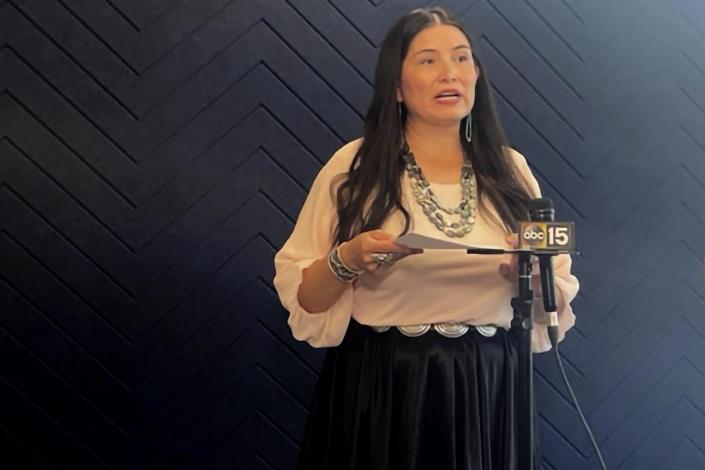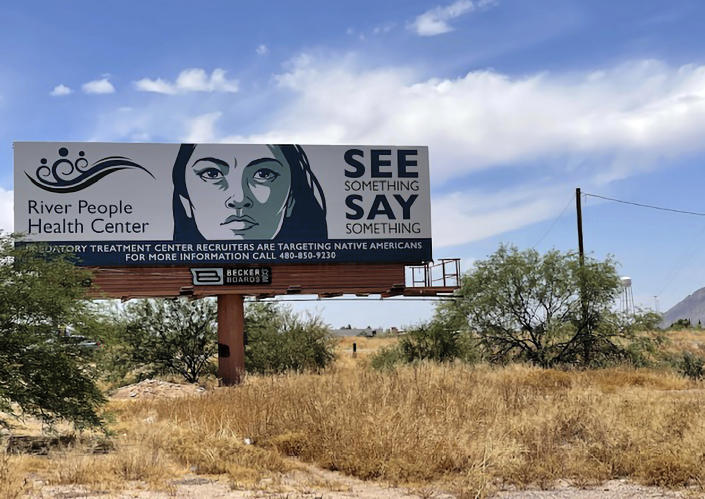https://apnews.com/article/arizona-medicaid-fraud-group-homes-ad7bd7d2faa3f2aa068059b97a8b931f
Arizona’s governor and attorney general announce crackdown on Medicaid fraud
May 16, 2023
PHOENIX (AP) — Arizona Gov. Katie Hobbs and other top state officials announced a crackdown Tuesday on Medicaid fraud, particularly honing in on illegitimate group homes.
The Hobbs administration said many of those homes target tribal community members and have defrauded the state out of hundreds of millions of dollars.
An investigation that involved the FBI and the U.S. Attorney’s Office has resulted in at least 45 indictments by the office of Arizona Attorney General Kris Mayes.
Mayes said $75 million has been seized or recovered related to the schemes.
Authorities said the money was paid out by the state’s Medicaid program — the Arizona Health Care Cost Containment System — and the illegal activity involved billing for mental health treatment and addiction rehabilitation that never was provided.
They also said illegal activity also involved billing for mental health treatment and addiction rehabilitation that was never provided.
AHCCCS has since suspended payments to more than 100 providers and the agency expects more in the coming months.
New actions announced include a third-party forensic audit examining mental health and addiction provider claims since 2019, new processes for concerning or unusual claims and an overhaul of the fraud detection methods used.
“Prior to my administration, AHCCCS had taken a piecemeal approach to targeting these fraudulent providers,” Hobbs said. “Under my administration this will change… Together, we are going to bring about the systemic reforms we need to root out this problem and deliver true accountability.”
Daniel Scarpinato, who served as chief of staff for Hobbs’ predecessor, Republican Gov. Doug Ducey, was critical of the announcement of the crackdown.
“The investigation revealed today has been underway for several years, well before the current occupants took office,” Scarpinato said.
Hobbs and Mayes appeared at a news conference that also included representatives of 13 tribes from around the state.
Hundreds of tribal members, mostly Navajo, living on Phoenix streets amid fake sober home crackdown


1 / 2
Medicaid Fraud Indigenous Arizona
Navajo Nation Attorney General Ethel Branch speaks at a news conference on Monday, June 23, 2023, in Phoenix to offer an update on Operation Rainbow Bridge, a plan that aims to help tribal members who have been affected by a massive Medicaid fraud scheme. (AP Photo/Anita Snow)
ASSOCIATED PRESS
ANITA SNOW
Mon, June 12, 2023 at 6:27 PM CST
PHOENIX (AP) — Navajo law enforcement teams made contact with several hundred Native Americans from various tribes who are living on the streets in the metro Phoenix area, after the state cracked down on Medicaid fraud and suspended unlicensed sober living homes, Navajo Nation Attorney General Ethel Branch said Monday.
Teams that included Navajo police officers reported making contact with more than 270 Native Americans, the majority of them Navajo, Branch said.
Many tribal members accepted offers to stay in motel rooms or other temporary housing for a few days before moving to legitimate facilities, while others agreed to return home to their reservations, Branch said. The teams worked with local police agencies and Community Bridges, Inc., a nonprofit that provides services for people with addictions.
“Unfortunately, many of our relatives when they came out of these facilities didn’t have cell phones,” Branch said, adding that Navajo police officers allowed the people they found to use their own cell phones to call their families.
While the Navajo law enforcement teams have returned to the reservation for now, the tribe will maintain its presence in Phoenix through an operations center.
In response to Arizona’s announcement last month it was cutting off Medicaid funding to more than 100 unlicensed and fraudulent sober living homes, most of them in metro Phoenix, the Navajo Nation launched its Operation Rainbow Bridge. The targeted homes are closing, leaving many people who had sought professional help to overcome their addictions with nowhere to live.
The Operation Rainbow Bridge toolbox includes a Facebook page and a TikTok account now under construction. There’s also a 211 hotline that the tribe is advertising among its members that allows those affected to find a place to stay and get the services they need.
Navajo officials say that in some cases, people who ended up in the homes were picked up in unmarked vans and driven to the Phoenix area from faraway places on the sprawling Navajo Nation that stretches across northern Arizona, and parts of New Mexico and Utah. It’s unclear who paid to transport the people to homes.
The Arizona Health Care Cost Containment System, which oversees the state’s Medicaid programs, had been paying out money for addiction and other mental health services that state officials say the homes billed for, but never delivered, under the American Indian Health Program.
State officials believe the fake homes have defrauded Arizona out of hundreds of millions of its share of federal Medicaid dollars. Arizona authorities so far have seized $75 million and have issued 45 indictments in the investigation that also includes the FBI and the U.S. Attorney General’s Office.
Arizona officials have said hundreds of fake sober living homes are believed to be currently operating in the Phoenix area and other parts of the state.